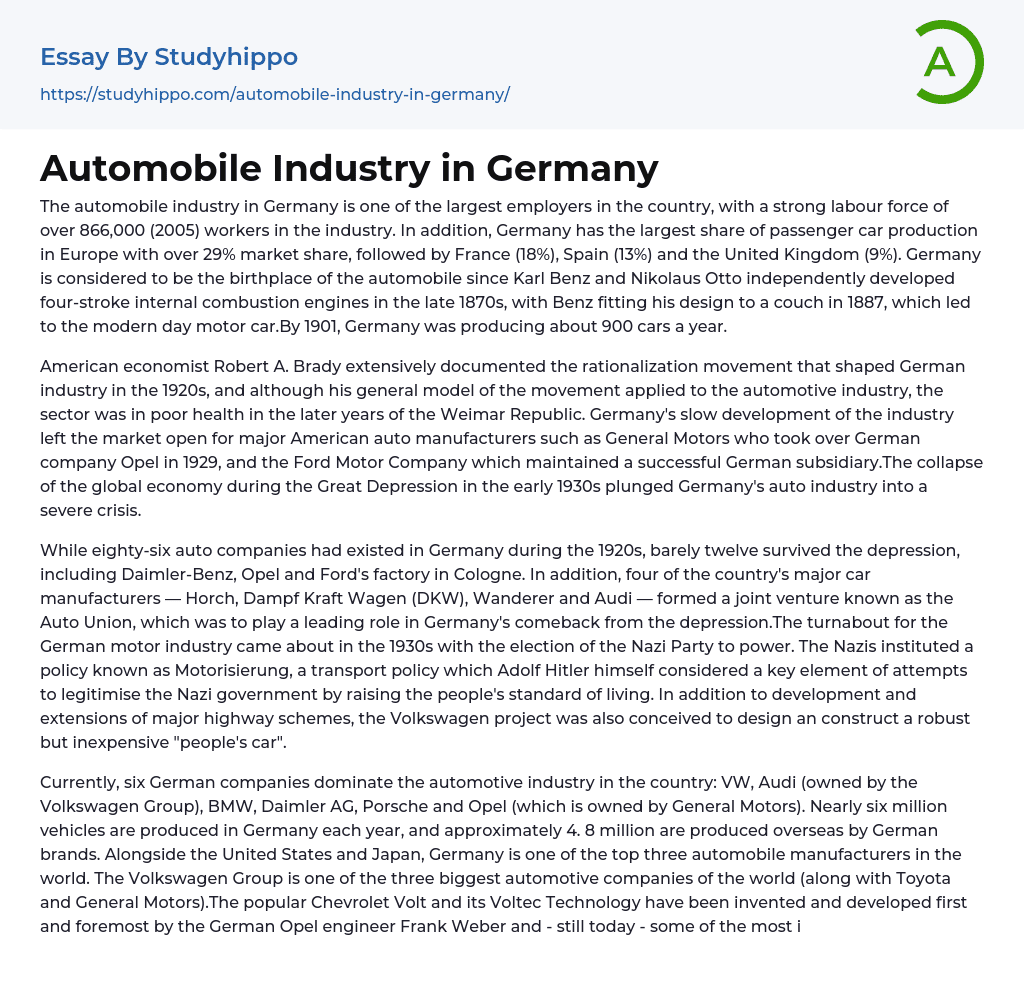The automobile industry in Germany is one of the largest employers in the country, with a strong labour force of over 866,000 (2005) workers in the industry. In addition, Germany has the largest share of passenger car production in Europe with over 29% market share, followed by France (18%), Spain (13%) and the United Kingdom (9%). Germany is considered to be the birthplace of the automobile since Karl Benz and Nikolaus Otto independently developed four-stroke internal combustion engines in the late 1870s, with Benz fitting his design to a couch in 1887, which led to the modern day motor car.By 1901, Germany was producing about 900 cars a year.
American economist Robert A. Brady extensively documented the rationalization movement that shaped German industry in the 1920s, and although his general model of the movement applied to the automotive
...industry, the sector was in poor health in the later years of the Weimar Republic. Germany's slow development of the industry left the market open for major American auto manufacturers such as General Motors who took over German company Opel in 1929, and the Ford Motor Company which maintained a successful German subsidiary.The collapse of the global economy during the Great Depression in the early 1930s plunged Germany's auto industry into a severe crisis.
While eighty-six auto companies had existed in Germany during the 1920s, barely twelve survived the depression, including Daimler-Benz, Opel and Ford's factory in Cologne. In addition, four of the country's major car manufacturers — Horch, Dampf Kraft Wagen (DKW), Wanderer and Audi — formed a joint venture known as the Auto Union, which was to play a leading role in Germany's comeback from
the depression.The turnabout for the German motor industry came about in the 1930s with the election of the Nazi Party to power. The Nazis instituted a policy known as Motorisierung, a transport policy which Adolf Hitler himself considered a key element of attempts to legitimise the Nazi government by raising the people's standard of living. In addition to development and extensions of major highway schemes, the Volkswagen project was also conceived to design an construct a robust but inexpensive "people's car".
Currently, six German companies dominate the automotive industry in the country: VW, Audi (owned by the Volkswagen Group), BMW, Daimler AG, Porsche and Opel (which is owned by General Motors). Nearly six million vehicles are produced in Germany each year, and approximately 4. 8 million are produced overseas by German brands. Alongside the United States and Japan, Germany is one of the top three automobile manufacturers in the world. The Volkswagen Group is one of the three biggest automotive companies of the world (along with Toyota and General Motors).The popular Chevrolet Volt and its Voltec Technology have been invented and developed first and foremost by the German Opel engineer Frank Weber and - still today - some of the most important parts of the development of GM's e-rev vehicle is done in Germany.
Global financial crisis has had an adverse impact on Germany automobile makers and suppliers. A number of internationally well known automobile companies in Germany have been forced to bring down their production levels and this list includes BMW and Volkswagen. After third quarter of financial year 2008 sales of leading car manufacturers Porsche and Daimler AG have gone down as well.Demand for
their cars has decreased too.
Matthias Wismann, who is president of Germany Association of Automotive Industry has said that there has been a decrease in projections as pace of sales in the Germany automotive industry has gone down to a significant extent. Lesser cars are being sold and all these factors have contrived to bring down growth prospects of Germany auto industry. Germany Association of Automotive Industry has forecast that in 2009 amount of new car registrations would be in region of 2. 9 million. It is significantly lesser than 2008 when 3.
1 million car registrations had been projected.
- Bentley essays
- Renault essays
- Truck essays
- chrysler essays
- The city essays
- Racing essays
- Automobile essays
- Bus essays
- Civil engineering essays
- Cycling essays
- Electric Car essays
- Genetic Engineering essays
- Hybrid essays
- Innovation essays
- Internal Combustion Engine essays
- Invention essays
- Mechanical Engineering essays
- Mechanics essays
- Software Engineering essays
- Telephone essays
- Automotive essays
- Automotive Industry essays
- Commerce essays
- Construction essays
- E Commerce essays
- Grocery stores essays
- Paper Industry essays
- Pharmaceutical industry essays
- Pharmacy essays
- Polymers essays
- Real Estate essays
- Textile Industry essays
- Bicycle essays
- Cars essays
- Rms Titanic essays
- African American essays
- African American Culture essays
- American Values essays
- Asian American essays
- Chinese essays
- Ethnicity essays
- Ethnocentrism essays
- German essays
- Han Chinese essays
- Hispanic essays
- Identity essays
- Korean essays
- Mexican essays
- Nation essays
- Native American essays




